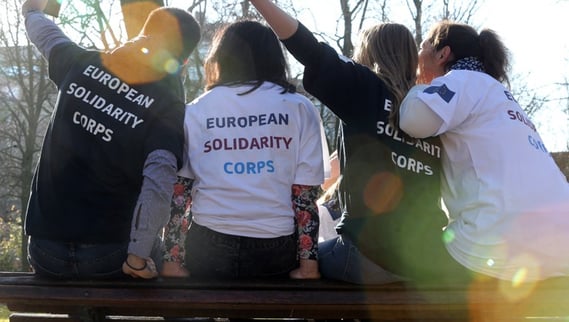European Solidarity Corps
Discover the European program


The European Solidarity Corps (ESC) is a European Union programme that offers young people the opportunity to participate in solidarity activities at local, national and international level. Created with the aim of promoting solidarity as a fundamental value of Europe, the ESC enables young people to acquire skills, build relationships and actively contribute to the well-being of communities. This programme is open to people aged between 18 and 30 and is based on the principles of inclusion, sustainability and active participation, allowing participants to become protagonists of social change.
The European Solidarity Corps has several key objectives:
-Promote solidarity: Foster a sense of shared responsibility and social commitment, addressing challenges such as exclusion, poverty and environmental degradation.
-Strengthen young people's skills: Offer practical learning experiences that improve personal, social and professional skills.
-Support local communities: Help communities find sustainable and innovative solutions to their needs.
-Encouraging active citizenship: Stimulating democratic participation and a sense of belonging to the European community.
The programme's priorities include:
-Inclusion and Diversity: Creating opportunities for all young people, with a particular focus on those facing economic, social or cultural barriers.
-Environmental Sustainability: Supporting projects that promote the fight against climate change, the conservation of natural resources and green lifestyles.
-Digital Skills: Fostering the development of technological skills that enable young people to face the challenges of an increasingly digitalised society.
-Youth Participation: Strengthening the active role of young people in political and social life, promoting democratic values and human rights.
The ESC is divided into two main types of activities: volunteering activities and solidarity projects. These initiatives, complementary to each other, offer a variety of experiences that respond to different personal and collective needs.
Volunteering Activities
Volunteering activities are the essence of the European Solidarity Corps. They allow young people to engage in projects that address social and environmental challenges, both in their country of residence and in other EU countries or international partners.
Volunteering activities are divided into:
Individual volunteering: A full-time opportunity, which can last from 2 to 12 months, in which participants collaborate with organisations on projects with a social impact. Areas of intervention include education, social inclusion, environment, culture and sport.
Group volunteering: Involves small groups of young people for a short period (2 weeks - 2 months), focusing on rapid and targeted interventions, such as responding to environmental emergencies or promoting cultural events.
Solidarity Projects
Solidarity projects are initiatives designed and implemented by young people themselves to respond to the needs of their local communities. These projects, which can last from 2 to 12 months, involve groups of at least 5 young people and aim to produce a positive and sustainable change in the territory.
Areas of intervention include:
-Inclusion of vulnerable people, such as migrants, refugees or disabled people.
-Promotion of environmental sustainability through local actions.
-Awareness raising on human rights, gender equality and democratic participation.
-Creation of cultural and social gathering spaces.
Key features:
-Youth leadership: Participants design and implement activities directly, acquiring leadership, planning and management skills.
-Sustainability and Innovation: Each project is designed to generate lasting benefits for the community, with creative solutions to local challenges.
-Mentorship and Support: Groups can count on a mentor who guides them in the process of planning and implementing the project.
Solidarity projects receive funding to cover organizational costs and, if necessary, additional support for young people with fewer opportunities.
The ESC programme not only contributes to the personal growth of young people, but also represents a driver of social transformation. Through volunteering and solidarity projects, participants develop empathy, initiative and collaboration skills, becoming more aware and responsible European citizens.
Furthermore, the ESC is a concrete example of how the European Union is committed to building a more cohesive, inclusive and sustainable society, offering young people tools to face the challenges of today and tomorrow.


